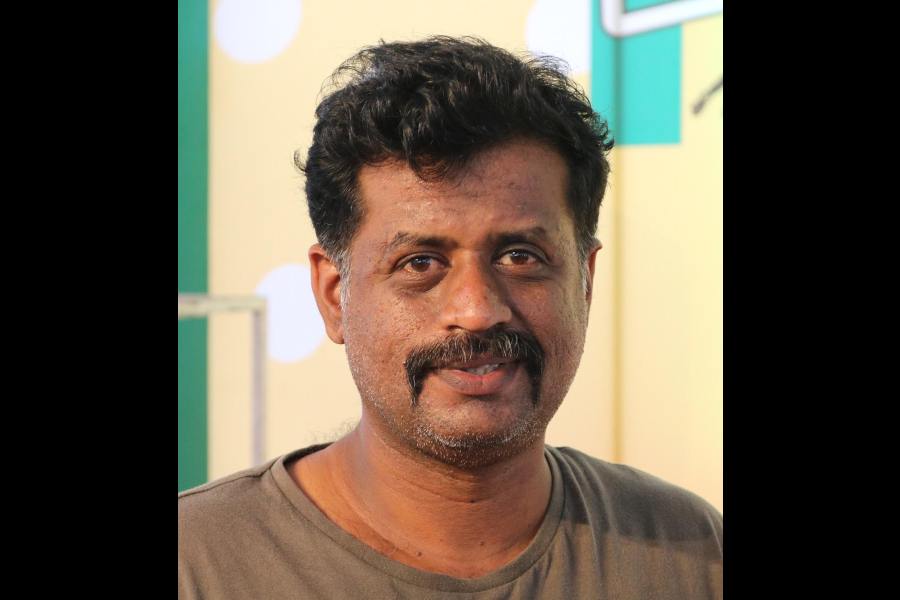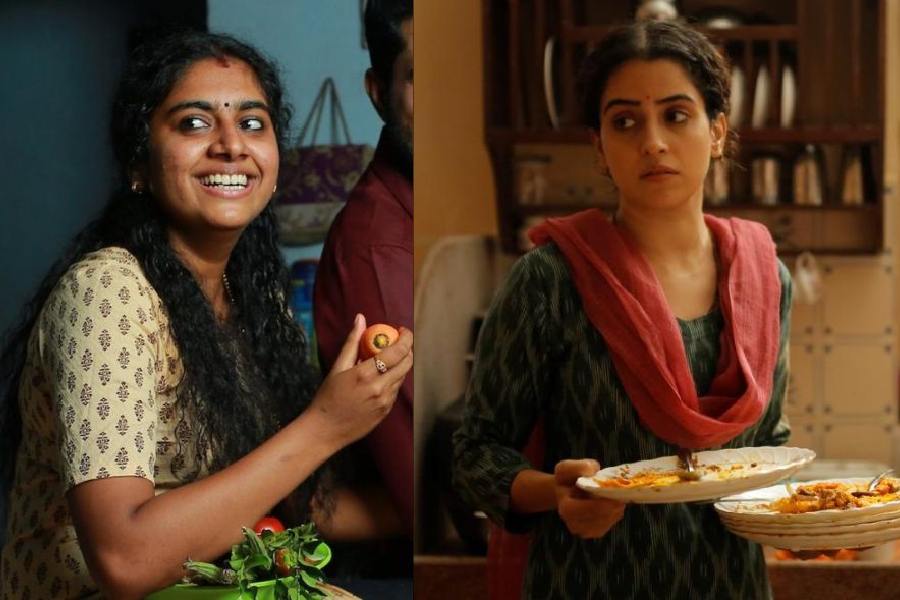Shutting doors and resounding “Nos” were the most common responses Jeo Baby got in 2021 when he was looking for a platform to stream his film The Great Indian Kitchen. He tells The Telegraph over a video call, “I never got a real reason for the rejection. Few of them would mumble that it’s repetitive but nothing more.”
Jeo Baby is a screenwriter and director based in Kerala and best-known for Malayalam films such as Kilometers and Kilometers (2020) and the Mammootty-starrer Kaathal — The Core (2023).
But it is his 2021 family drama The Great Indian Kitchen (2021) that earned the 42-year-old national acclaim and a clutch of awards. The film tells the story of a newlywed woman who gradually finds herself confined to the itinerant demands of her household kitchen. Much of the film focuses on her mehendi-adorned hands, chopping, grinding, grating and cooking kappa biryani, fish curry, puttu, banana chips, pazham pori and halwas on the same gas stove. The sink next to it, when it is not clogged with dirty water, keeps filling up with unwashed dishes. The tap drips away. The scene repeats itself to drive home the never-ending nature of the new bride’s labour. After a while, the audience forgets the face and the person attached to the tireless hands.
When all major OTT platforms and TV channels had rejected the film, Neestream, an independent OTT platform for Malayalam cinema, released it. Neestream is now defunct but Charles George, who headed it, says, “We were confident that the film would do well because we were well aware of the Kerala film market and its pulse.”
In the first 90 days of its release, the audience response was strong enough for the bosses of streaming platforms to change their minds. Jeo Baby says, “I am very grateful to my audience, especially the women who wrote to me; many of them were first-time reviewers.” Within a year or so, Jeo Baby had sold the remake rights of the film.

Director Jeo Baby
With the release of each remake, the conversation about women and home starts afresh in yet another corner of the country.
Even after tasting success, Jeo Baby cannot forget the initial rejections. He says, “Once the film became successful, I started asking around.” Of course, he did not find a definitive answer. He says, “Maybe because all the platform heads are men and they possibly thought women’s suffering in the kitchen was too trivial a subject for a film.” He approached some women working for television channels. They said, “Since the film talks about women’s issues if only women champion it, it will become even more sidelined. Maybe our silence is better for you.”
Speaking of silences, even when he was a film student, Jeo Baby was drawn to the unsaid. There was this short film on same-sex relationships that stirred up controversy. And in his 2016 directorial debut 2 Penkuttikal, he addressed the societal pressures on young girls.
But in case of The Great Indian Kitchen, Jeo Baby insists he did not mean to make a “feminist film”, least of all one that makes any bold political statement. “It is about my personal experience,” he says.
“There was a time when my partner was studying and I took charge of our household kitchen. I would wake up at 6am and the chores never seemed to end. I could hardly catch a break, not even for 10 or 15 minutes. At night, I would finish everything and sit down to watch a film and within 10 minutes, I would be asleep.”
That got him to think about the women in his life. He grew up with working parents and two sisters. Even though the chores were equally distributed at home, he recalls an imbalance. On a typical movie night at home, he would have already selected a film when his mother and sisters would holler from the kitchen, “Let the title track roll, we will join you in 10 minutes.”
Today, Jeo Baby regrets aloud the fact that they would have to miss the title track and credits every time. He holds forth about the importance of a film’s opening sequence. He does not spell out that on a family movie night, he did not want to watch even the
beginning of a film just by himself, but you get a whiff of that underlying sentiment too. He
tells you he would hit the pause button and wait.
He says, “At times like these when the women in my life are engaged in various household responsibilities, I am not a man thinking about women’s liberation. All I am thinking while sitting alone in front of the TV is that I miss them. None of it is political, it is deeply personal.” It resonates in the film too. The film starts on a joyous note but soon the kitchen drives a rift between the husband and the wife, taking up more and more space until there is no husband and no wife.
“So as a filmmaker, I made a decision,” he continues. “I must talk about the kitchen in my film.”
His experience became the script. Even though he took three years to write it, there was no final draft. “I allowed the possibility of adding last-minute dialogues,” says Jeo Baby.
And that is how it is still evolving, as a remake in a Tamil household, in an urban kitchen in North India, and through a Kannada version in the offing.










